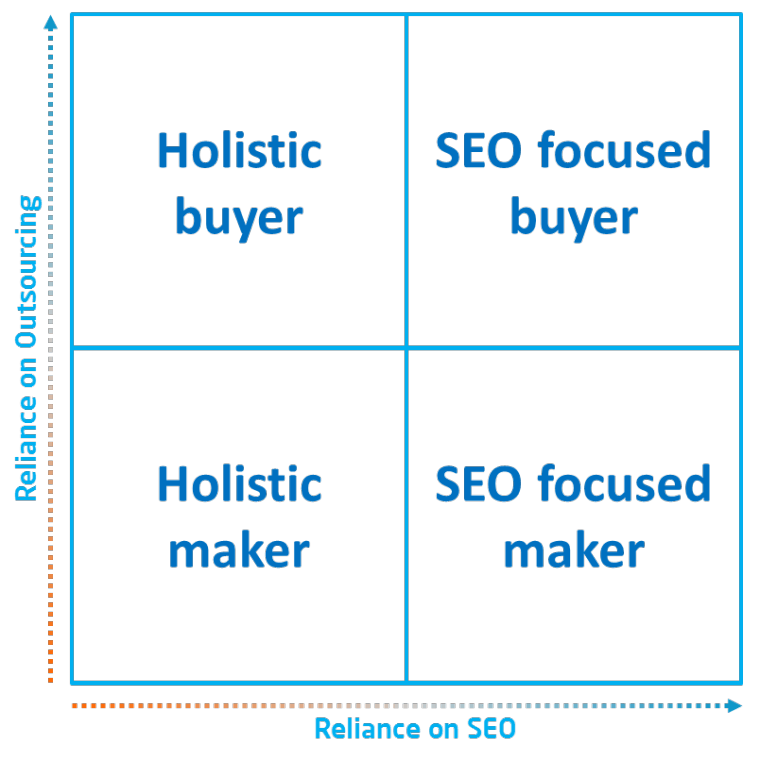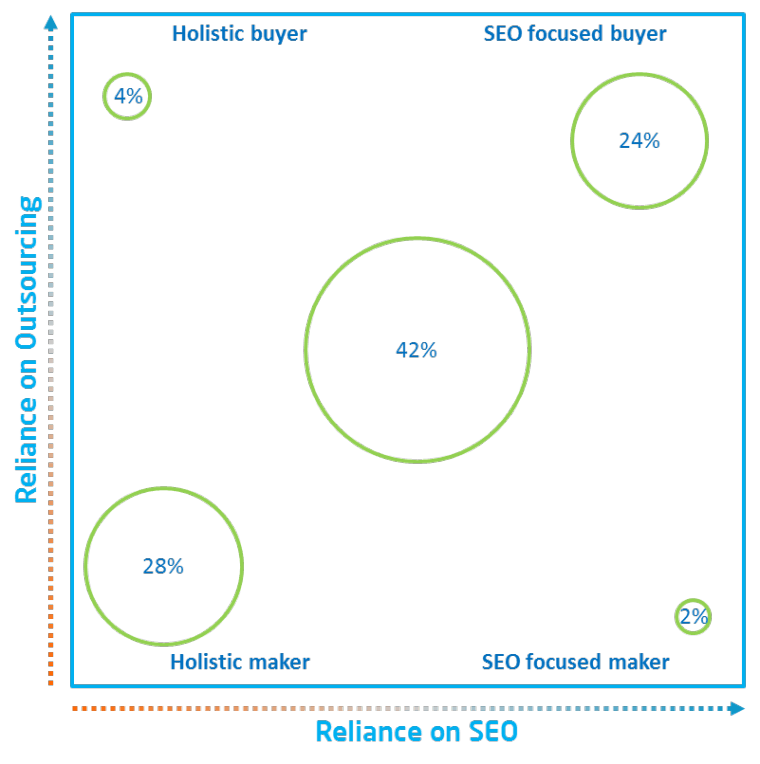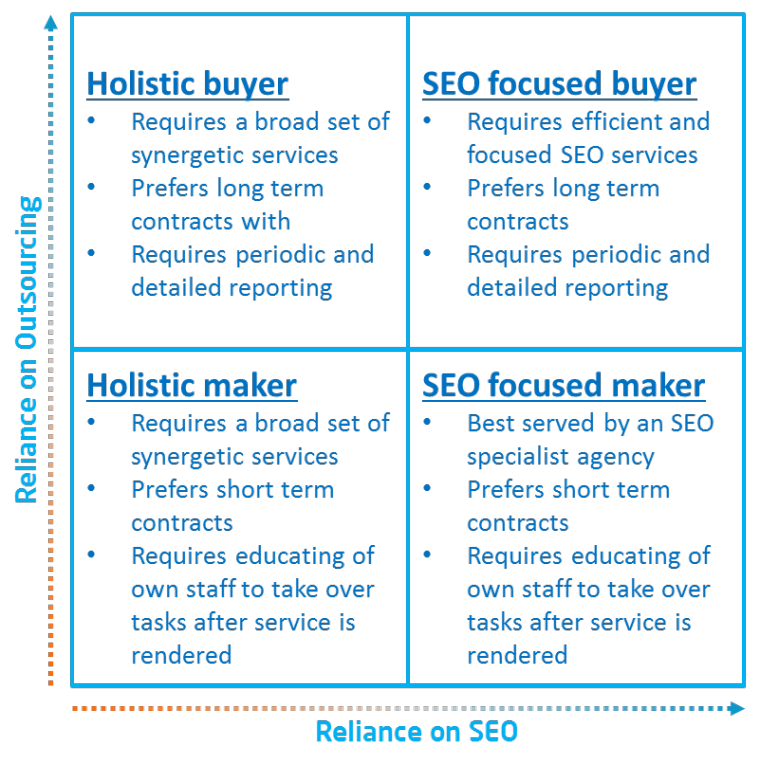A few weeks ago, I published the results of a study about the State of SEO Agencies, which was conducted by my company linkbird during the months of August and September. Based on the same study, I hope to shed some light on the type of agencies and the type of clients prevalent in the online marketing services industry.
I looked at the data about online marketing budgets, proportion of budgets spent on SEO, and the proportion reserved for outsourcing activities. From this analysis three things became clear to me.
1. Agency’s Focus on SEO
The participating agencies were asked to disclose the percentage of their revenues spent on SEO activities for their client. About one-third of the agencies spend 25% or more of their revenue on SEO activities for their client, as these are SEO specialist agencies. Another third of the agencies spend less than 5% on SEO for their clients, these are full-stack online marketing agencies who offer SEO only as a part of their total offering.

All other online marketing agencies fall somewhere between these two extremes, undertaking activities related to search engine marketing, web design, content marketing, social media marketing, analytics, public relations, mobile marketing, and more.
2. Client’s Reliance on SEO
When I looked at the percentage of online marketing budgets that companies spend on SEO activities, I found there are companies that rely heavily on SEO (29%), while others spend only small portion of their online marketing budget on SEO (21%). Based on these statistics, I can express “Reliance on SEO” as a spectrum, where at one extreme you have marketers who do not focus on SEO, and on the other extreme you have marketers which heavily rely on SEO.

Marketers who spend only a small portion of their only marketing budgets on SEO tend to rely on other methods to reach their objectives. In essence, they employ a holistic approach to online marketing, combining content marketing, online PR, and social media tactics.
3. Client’s Reliance on Outsourcing
Companies which are open to hiring an agency for outsourcing their online marketing activities do so at varying intensities. One in four companies spends less than 5% of their budget on agencies, these companies are makers. In essence, these companies would rather do it themselves and only hire if they lack resources, time, or expertise.

On the other hand only one in eight (12%) companies spends more than 25% of their online marketing budget on agencies. These companies are buyers, who have outsourcing as a part of strategy. Buyers tend to focus on what they are good at and outsource the rest to agencies.
How Does it All Fit Together?
I can arrange these spectra in a matrix to divide the online marketing services demand side into four different client categories.

Here is distribution of the clients divided over the holistic/SEO focused and buyer/maker spectra. While calculating the percentages I loosened the criteria from less than 5% to less than 10% for the lower limit and from more than 25% to more than 20% for the upper limit. For instance, SEO focused buyers are marketers who spend less than 10% of their online marketing budget on SEO and who are willing to spend 20% or more of their budget to outsource online marketing activities.

In the distribution of clients, the central group representing 42% of the market does not show a consistent pattern. The marketers belonging to this group tend to spend 10% to 20% of their online marketing budget on SEO and have 10% to 20% of their budget allocated for outsourcing activities. Do note that these numbers do not take into consideration the companies that simply do not intend to hire any agencies for their online marketing.
Each of the four distinct categories has common traits which agencies should take into consideration.
Holistic Buyers
- Prefer the use of a variety of online marketing disciplines to achieve their objectives
- Focus on creating synergetic effects by combining SEO, content marketing, online PR, social media, and SEA
- Aim to not only attract traffic but also build brand presence, create engagement, and foster discussion with the audience
- Depend on agencies to execute a majority of their online marketing activities, therefore they are very careful about who they hire
- Require a variety of on-going services from agencies
- Would rather have long-term contracts
- Tend to outsource as a part of strategy
- Need periodical and detailed reporting since the projects are long-term / on-going
- Are best served by full-stack online marketing agencies
- Are a small percentage of the total demand
SEO Focused Buyers
- Prefer to focus on SEO to reach their goals and only place minimum emphasis on other online marketing activities
- Focus mainly on on-page and off-page SEO with less emphasis on other online marketing activities
- Aim to generate organic traffic through search engines which converts
- Depend on agencies to execute flawless and ethical SEO
- Would rather have long-term contracts
- Tend to outsource as a part of strategy
- Need periodical and detailed reporting
- Are best serviced by SEO specialists agencies
- Represent a large portion of the total demand

Holistic Makers
- Are similar to holistic buyers in the regard that they prefer to use a variety of online marketing disciplines to achieve their objectives
- Just like holistic buyers, tend to focus on creating synergetic effects by combining SEO, content marketing, online PR, and social media
- Prefer not to be dependent on agencies for prolonged periods, but rather would like to develop in-house capacity to take over the tasks once the service has been rendered
- Require a variety of services from agencies which have a clear start and end
- Would rather engage in short-term contracts
- Tend to outsource in order to learn from agency best practices with the aim of applying it themselves
- Represent a large percentage of the total demand
SEO Focused Makers
- Are similar to SEO focused buyers in the sense that they also prefer to focus on SEO to reach their goals
- Just like SEO focused buyers, put emphasis on on-page and off-page SEO
- Have traffic through search engines which converts as the top goal
- Prefer to develop in-house skills to execute flawless and ethical SEO
- Aim to use short-term contracts to learn from pioneering SEO agencies
- Tend to outsource mainly due to lack of expertise
- Need periodical and detailed reporting
- Are best served by SEO specialists agencies
- Represent a very small portion of the total demand
So What Does This All Mean?
First off, the online marketing services industry is divided in three equal parts: full-stack agencies, SEO specialist agencies, and agencies which fall between these two categories.
Specialization is important, where agencies choose from becoming SEO specialists who focus on impeccable and penalty-proof SEO results, or full-stack online marketing agencies which combine several overlapping disciplines such as SEO, content marketing, SEA, and online PR to create synergies.
Secondly, the large difference between demand for services from holistic and SEO focused marketers indicates that:
- SEO services can be more easily outsourced than other online marketing services such as content creation, online PR, and social media marketing
- The supply side is better equipped to sell SEO services.
On the other hand, the small amount of holistic buyers in contrast to a large amount of holistic makers, indicates that activities which are part of a holistic approach are harder to outsource separately. Looking at the supply side, one can see that one-third of the agencies are full-stack so it should be very hard to outsource activities that go together in a holistic approach. However, the question that arises is “How many of the full-stack agencies in fact sell services in bundles?”, to which I would like to ask you pitch in.
These were my two cents about the SEO agencies and clients landscape based on the research that we did. What are you opinions? How do you see the landscape?
All the information and analysis used in this article can be found in this downloadable PDF report on our site, after filling out an email opt-in form.
Image Credits
Featured Image: Pui Shan Chan and Amanda Paul via Wikipedia
All images are created by linkbird for Search Engine Journal





